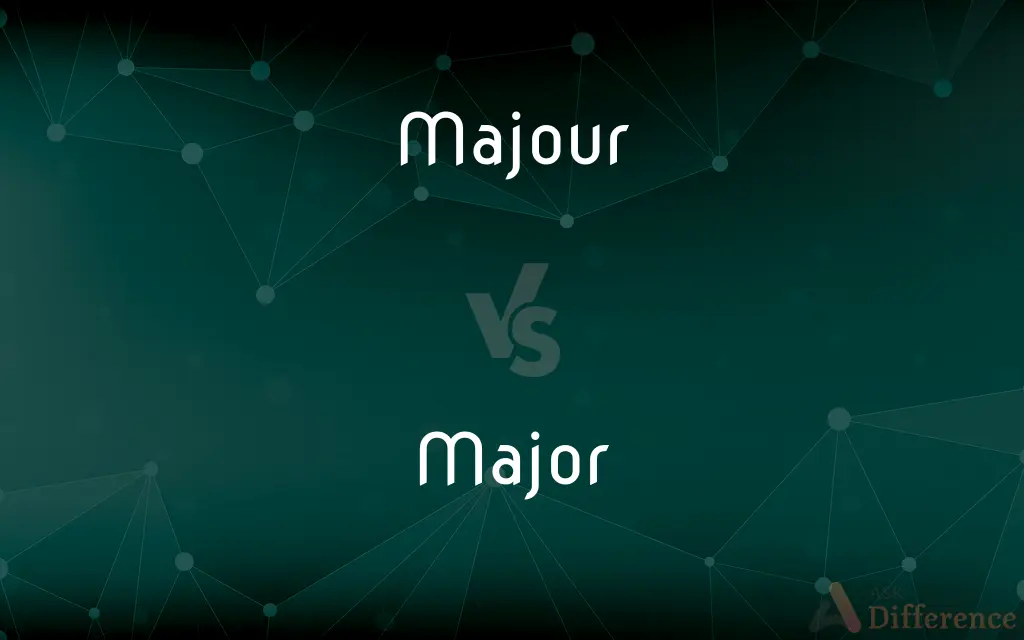Majour vs. Major — What's the Difference?
By Tayyaba Rehman — Updated on October 20, 2023
Majour is a rare and archaic spelling of Major, while Major is the more common and contemporary spelling meaning significant, principal, or a military rank.

Difference Between Majour and Major
Table of Contents
ADVERTISEMENT
Key Differences
Majour, an old-world term, finds its roots in historical documents and antiquated English. Major, on the other hand, is a recognized term in modern English used in various contexts. Although both words have a similar etymology, their prevalence in contemporary language varies greatly.
In some rare old manuscripts, Majour might be seen as a designation for a ranking or authority. In contrast, Major is widely recognized today not just as a military rank but also an adjective describing something of greater importance.
The spelling "Majour" can cause confusion for modern readers, largely because it's not a term they would encounter regularly. Major, however, is ubiquitous, seen in academia (as in a "major" field of study), in music (major scale), and other fields.
Historians or those keen on studying historical English might come across "Majour" and recognize its context. For the average individual, "Major" is the recognizable term, instantly conveying a sense of importance or rank.
Comparison Chart
Spelling
Archaic and rare
Standard and widely accepted
ADVERTISEMENT
Usage
Historical documents
Military, Academia, Music, and more
Recognition
Mostly unfamiliar to modern readers
Familiar to most
Synonyms
Few due to its rarity
Principal, chief, main, primary, leading
Derivation
Historical English
Modern English
Compare with Definitions
Majour
An archaic spelling of "Major."
I found the term Majour in an old manuscript.
Major
A primary field of academic study.
She's a physics major.
Majour
A historical term denoting rank or authority.
The Majour was respected in his town.
Major
Of greater importance.
This is a major concern for us.
Majour
Rarely used in contemporary English.
It's unusual to come across the term Majour these days.
Major
A military rank above captain.
He was promoted to Major last year.
Majour
Found in antiquated English literature.
Classic literature sometimes references a Majour.
Major
Denoting the major version in software.
The software had a major update.
Majour
A word with roots similar to "Major."
Majour and Major share a similar etymology.
Major
Relating to the key of a musical scale.
The song is in C major.
Majour
Obsolete form of major
Major
Major is a military rank of commissioned officer status, with corresponding ranks existing in many military forces throughout the world.
Majour
Obsolete form of major
Major
Important, serious, or significant
The use of drugs is a major problem
Major
(of a scale) having intervals of a semitone between the third and fourth, and seventh and eighth degrees.
Major
(appended to a surname in public schools) indicating the elder of two brothers.
Major
(of a term) occurring as the predicate in the conclusion of a categorical syllogism.
Major
A rank of officer in the army and the US air force, above captain and below lieutenant colonel.
Major
A major key, interval, or scale.
Major
A major organization or competition
The majors have swept up the smaller independent companies in licensing deals
It's not unreasonable to believe someone can win all four majors
The oil majors had a profit bonanza
Major
A student's principal subject or course
Many students would ignore courses outside their major
Major
A major term or premise.
Major
Short for major suit
South was anxious to mention his four-card major and bid one spade
Major
A goal.
Major
Specialize in (a particular subject) at college or university
I was trying to decide if I should major in drama or English
Major
Greater than others in importance or rank
A major artist.
Major
Great in scope or effect
A major improvement.
Major
Great in number, size, or extent
The major portion of the population.
Major
Requiring great attention or concern; very serious
A major illness.
Major
(Law) Legally recognized as having reached the age of adulthood.
Major
Of or relating to the field of academic study in which a student specializes.
Major
Designating a scale or mode having half steps between the third and fourth and the seventh and eighth degrees.
Major
Equivalent to the distance between the tonic note and the second or third or sixth or seventh degrees of a major scale or mode
A major interval.
Major
Based on a major scale
A major key.
Major
A commissioned rank in the US Army, Air Force, or Marine Corps that is above captain and below lieutenant colonel.
Major
One who holds this rank or a similar rank in another military organization.
Major
One that is superior in rank, importance, or ability
An oil-producing country considered as one of the majors.
Major
(Law) One recognized by the law as having reached the age of adulthood.
Major
A field of study chosen as an academic specialty.
Major
A student specializing in such studies
A linguistics major.
Major
A major premise.
Major
A major term.
Major
A major scale, key, interval, or mode.
Major
A chord containing a major third between the first and second notes and a minor third between the second and third notes.
Major
Majors Sports The major leagues.
Major
To pursue academic studies in a major
Majoring in mathematics.
Major
(attributive):
Major
Greater in dignity, rank, importance, significance, or interest.
Major
Greater in number, quantity, or extent.
The major part of the assembly
Major
Notable or conspicuous in effect or scope.
Major
Prominent or significant in size, amount, or degree.
To earn some major cash
Major
(medicine) Involving great risk, serious, life-threatening.
To suffer from a major illness
Major
Of full legal age, having attained majority.
Major children
Major
(education) Of or relating to a subject of academic study chosen as a field of specialization.
Major
(music):
Major
Having intervals of a semitone between the third and fourth, and seventh and eighth degrees.
Major scale
Major
Equivalent to that between the tonic and another note of a major scale, and greater by a semitone than the corresponding minor interval.
Major third
Major
(postpositive) of a key Based on a major scale, tending to produce a bright or joyful effect.
Major
(campanology) Bell changes rung on eight bells.
Major
Indicating the elder of two brothers, appended to a surname in public schools.
Major
(logic)
Major
Occurring as the predicate in the conclusion of a categorical syllogism.
Major
Containing the major term in a categorical syllogism.
Major
(military ranks) A rank of officer in the army and the US air force, between captain and lieutenant colonel.
He used to be a major in the army.
Major
An officer in charge of a section of band instruments, used with a modifier.
Major
A person of legal age.
Major
(music):
Major
Ellipsis of major key.
Major
Ellipsis of major interval.
Major
Ellipsis of major scale.
Major
(campanology) A system of change-ringing using eight bells.
Major
A large, commercially successful company, especially a record label that is bigger than an indie.
Major
The principal subject or course of a student working toward a degree at a college or university.
Midway through his second year of college, he still hadn't chosen a major.
Major
A student at a college or university specializing on a given area of study.
She is a math major.
Major
(logic):
Major
Ellipsis of major term.
Major
Ellipsis of major premise.
Major
(bridge) major suit.
Major
(Canadian football) A touchdown, or major score.
Major
(Australian rules football) A goal.
Major
An elder brother (especially at a public school).
Major
(entomology) A large leaf-cutter ant that acts as a soldier, defending the nest.
Major
(obsolete) mayor and {{en}}.
Major
(intransitive) major in
Major
Greater in number, quantity, or extent; as, the major part of the assembly; the major part of the revenue; the major part of the territory.
Major
Of greater dignity; more important.
Major
Of full legal age; adult.
Major
Greater by a semitone, either in interval or in difference of pitch from another tone.
Major
An officer next in rank above a captain and next below a lieutenant colonel; the lowest field officer.
Major
A person of full age.
Major
That premise which contains the major term. It its the first proposition of a regular syllogism; as: No unholy person is qualified for happiness in heaven [the major]. Every man in his natural state is unholy [minor]. Therefore, no man in his natural state is qualified for happiness in heaven [conclusion or inference].
Major
A mayor.
Major
A commissioned military officer in the United States Army or Air Force or Marines; below lieutenant colonel and above captain
Major
British statesman who was prime minister from 1990 until 1997 (born in 1943)
Major
A university student who is studying a particular field as the principal subject;
She is a linguistics major
Major
The principal field of study of a student at a university;
Her major is linguistics
Major
Have as one's principal field of study;
She is majoring in linguistics
Major
Of greater importance or stature or rank;
A major artist
A major role
Major highways
Major
Greater in scope or effect;
A major contribution
A major improvement
A major break with tradition
A major misunderstanding
Major
Greater in number or size or amount;
A major portion (a majority) of the population
Ursa Major
A major portion of the winnings
Major
Of the field of academic study in which one concentrates or specializes;
His major field was mathematics
Major
Of a scale or mode;
Major scales
The key of D major
Major
Of greater seriousness or danger;
A major earthquake
A major hurricane
A major illness
Major
Of full legal age;
Major children
Major
Of the elder of two boys with the same family name;
Jones major
Common Curiosities
Is "Majour" a misspelling of "Major"?
No, "Majour" is an archaic spelling of "Major," though "Major" is now the accepted form.
Can "Majour" and "Major" be used interchangeably?
While they have similar roots, it's best to use "Major" in modern contexts to avoid confusion.
Where might I encounter the term "Majour"?
"Majour" is mostly found in historical documents and old-world literature.
Why is "Majour" rarely used today?
Modern English has evolved, and "Major" has become the accepted spelling and form of the word.
Is it wrong to use "Majour" in modern writing?
While not "wrong", using "Majour" might confuse modern readers who are more familiar with "Major."
How can I identify the context of "Major" in a sentence?
The meaning of "Major" can be inferred from surrounding words and the overall context of the sentence.
Does "Major" always refer to a military rank?
No, "Major" can refer to military rank, a primary academic field, or describe importance, among other meanings.
Is "Major" always used as a noun?
No, "Major" can be used both as a noun (e.g., military rank) and an adjective (e.g., major concern).
Does "Major" have meanings in fields outside of the military?
Yes, "Major" is used in academia, music, software, and other areas.
Do any contemporary authors use "Majour" for stylistic purposes?
Some might use "Majour" for historical fiction or to invoke an old-world feel, but it's not common in modern literature.
How did "Majour" come into existence?
"Majour" has roots in historical English and has been used in old manuscripts.
Are there other words similar to "Majour" in old English literature?
Yes, many words have archaic spellings that have since evolved in modern English.
Are there other archaic spellings related to "Major"?
"Majour" is the primary archaic spelling, but language has many words with historical variants.
How prevalent is the use of "Major" in everyday language?
"Major" is widely used in various contexts, making it a familiar term to most speakers of English.
Why did "Majour" evolve into "Major"?
Language naturally evolves over time due to various factors, including ease of use, standardization, and influence from other languages.
Share Your Discovery

Previous Comparison
Orthopedic vs. Orthotic
Next Comparison
Striker vs. ForwardAuthor Spotlight
Written by
Tayyaba RehmanTayyaba Rehman is a distinguished writer, currently serving as a primary contributor to askdifference.com. As a researcher in semantics and etymology, Tayyaba's passion for the complexity of languages and their distinctions has found a perfect home on the platform. Tayyaba delves into the intricacies of language, distinguishing between commonly confused words and phrases, thereby providing clarity for readers worldwide.














































